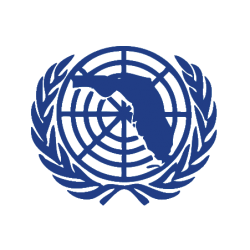Florida’s flagship high school Model United Nations conference returns for its 46th year. This four day conference is perfect for students interested in international affairs, economics, human rights, and political science. Whether you or your delegates are new to Model UN, or have been participating for years, FHSMUN 46 is the conference for you.
FHSMUN 46 will be held in person on the 21-24 February 2025. This will be a 4 day conference for high school students.
Check back here or look out for updates on our social media accounts or our emails for updates! Advisors, join our Mailing List for all the newest information by emailing advisor.relations@fhsmun.org
Registration is Open Now with Normal Pricing until Feb 20th! See details for how to register at the bottom of this page. Get Country Assignments with Registration!
A full Itinerary can be found here
Address
Hilton Altamonte Springs- 350 Northlake Blvd Altamonte Springs, FL 32701
Theme
Transforming Global Collaboration for Sustainable and Equitable Development
Committees
- UNSC (United Nations Security Council) – Joint Crisis Special Committee Member
- ILO (International Labour Organization) – Joint Crisis Special Committee Member
- UNEP (United Nations Environment Programme)
- COPUOS (Committee on the Peaceful Uses of Outer Space)
- WHO (World Health Organization)
- GA2 (General Assembly Second Committee)
- UNESCO (United Nations Educational, Scientific and Cultural Organization)
- HLPF (High-Level Political Forum on Sustainable Development)
Country Assignments & Position Papers
After registering for this conference, we will be sending Country Assignments and receiving Position Papers using the platform MyDAIS.org. See the following tutorials for how to register your students to your school and the conference committees.
Inviting Students and other Advisors to your school
How to Update Student Roster (Country Assignments)
Uploading a Position Paper on MyDais (Student Tutorial)
Registration
To register for this conference, we will be using the platform MyDAIS.org. See the following tutorials for how to register your school and for the conference. If you have any questions please contact our Director of Advisor and School Relations, Jermaine Covington advisor.relations@fhsmun.org
MyDais tutorials:
How to Sign Up for MyDais Online Platform
How to Create a New School on MyDais Dashboard
Inviting Students and other Advisors to your school
How To Register For a FHSMUN Conference
How to View/Pay FHSMUN Invoice
How to Update Student Roster (Country Assignments)
